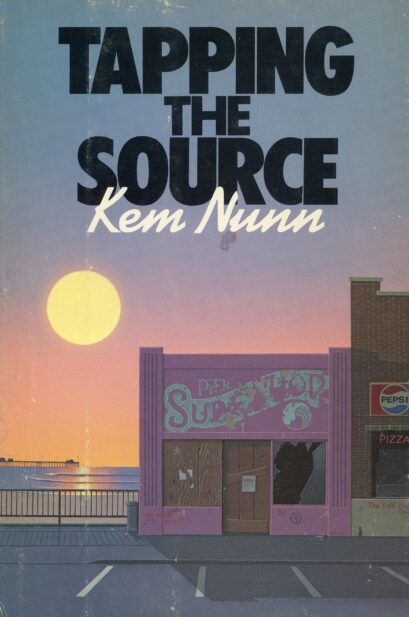 By KEM NUNN (Delacorte; 1984)
By KEM NUNN (Delacorte; 1984)
The debut novel of Kem Nunn, and the premiere example of “surf noir” (handily outdoing other examples like THE TRIBES OF PALOS VERDES and Nunn’s later THE DOGS OF WINTER). TAPPING THE SOURCE is also one of the most accurate fictional portrayals that exist of Southern California beach life, despite the fact that it’s extremely dated. The novel’s protagonist renting a seaside apartment in Huntington Beach for $50 a week seems downright surreal today, but made sense in 1984, the time before everything changed in So Cal (within another year or two beachside economics became much more expensive).
The teenaged Ike Tucker is a desert-dweller who travels to Huntington in search of his runaway sister Ellen, with whom he shared a nontraditional (read: incestuous) relationship. Ike finds the Huntington locals tribal and unfriendly, as in an early encounter with a surfer that ends with Ike getting beaten up (a passage that like so much else in this book was copied quite shamelessly by the 1991 flick POINT BREAK). He makes a friend, though, in Preston, an aging surfer who initiates his young charge into a world of drugs, pornography, murder and even Satanism.
It’s pretty obvious early on what has happened to Ike’s nowhere-to-be-found sister (teenage girls, it seems, have a tendency to disappear in this novel’s setting), but his immersion in this depraved subculture goes far beyond his initial intent as he comes to realize that “It was not only Ellen Tucker he pursued. It was himself as well.” The words Tapping the Source, first glimpsed on a surfboard Ike buys, also figure into his odyssey, it being a phrase that by the end comes to assume enormous literal and symbolic meaning.
The novel has been criticized for the ugliness of its content, but, speaking as one who’s lived much of his life in Southern California’s beach cities, I can attest that it’s not inaccurate (all that’s missing is racism). The unpleasantness, in another accurate observance, is contrasted with Ike’s beatific impressions of the area: “He was growing accustomed to a kind of dichotomy he had discovered here, a contradiction between the bleakness of the landscape and the beauty of the sea.”
The prose is suitably hardboiled, i.e. frank and declarative, yet evocative enough to permit flowery descriptions of the sea and the transcendence of surfing. Underlying it all is a strong grasp of the mechanics of storytelling, of which the author never loses sight.
